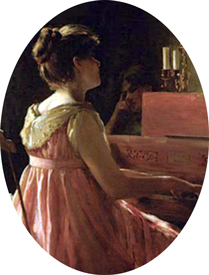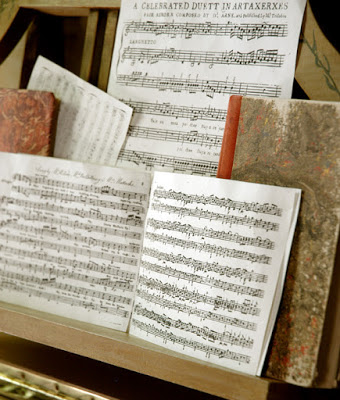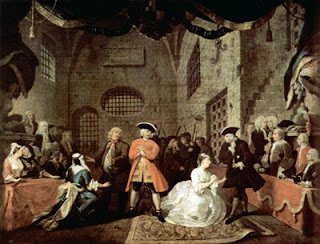A look at Miss Marianne's music
By Elspeth C. Young
One of my favorite things about creating The Storybook Home is the need we have to choose the subject for each article. Each issue becomes a treasure hunt for us—combing through each book, deciding what topics we'll be burrowing into during the months of research and creation. Sense and Sensibility was no whit behind in tantalizing our historic and creative curiosities. From down-sizing from Norland Estate, to the mulberry trees at Delaford, to Elinor's painted firescreens to the dainties Mrs. Jennings offered the grief-stricken Marianne, we've been stepping into Regency England Jane-Style, and loving every minute.
 |
| Painting by George A. Reid |
But as always, there's a treasure hunt tidbit or two which gets left out of the issue—the casualty of finite space. This time, one of the leftovers was a portion of the Music Box—my own discoveries about Marianne's music. Reading Austen's descriptions, I wondered what "opera duets" would have enticed a Willoughby or Marianne—Mozart? Gluck? Handel?—especially since the word "opera" contains such a wide swathe of traditions and definitions, and no film adaption of the novel gives much of a hint. (Though I imagine Jane would have wished for a composer like Patrick Doyle to compose especially for her heroines' pleasure.)
The answer to my opera question sent me on quite an interesting and unexpected odyssey. While Jane, herself, loved Haydn, Handel, Gluck, and other high-brow opera greats, her music books show equal proof of a taste for Arne, Dibdin, Shield—low-brow comic opera buffs of England's 18thcentury. Surprisingly, however, the little hint Miss Austen leaves in her narrative as an "opera, procured for her by Willoughby, containing some of their favourite duets, and bearing on its outward leaf [Marianne's] own name in [Willoughby's] hand-writing..." may point more favorably to Marianne and Willoughby inclining to the comic opera of the day—precursors of operettas more in keeping with Gilbert and Sullivan than Montiverdi—ballad operas filled to overflowing with the melodrama, ecstasies, and exaggerations similar to Marianne's own first love. By the time Marianne brought her "handsome pianoforte" to Barton cottage, complete piano transcriptions of decades-popular English operas were available for any Willoughby to purchase for their love, or any Lady Middleton to leave open on their instrument—and would have been much more readily available than a commercial piano transcription of "The Magic Flute" for instance. Such simplified folios enabled a musical evening filled with myriad melodies and merriment, or an afternoon overflowing with a young lady spending "whole hours at the pianoforte alternatively singing and crying," performing songs of love unrequited, the sighs of amorous youths, marriages forbidden, elopements indulged, reversals in fortune, and romantic reconciliations.
 |
| Photograph by Elspeth Young |
Many such transcriptions are digitized and widely available in both libretto and score in online archives. Their leather bindings, marble endpapers, and hand wrought elegance are a visual feast in their own right and, whether or not the music is deserving of a second listen, the folios, at least, are definitely worth celebrating. (As you can see, we couldn't resist recreating facsimiles of our own Willoughby-inspired leaflets to grace a "piano-forte" of our own, pictured right.)
For those not familiar with the genre (more commonly recognizable in their continental equivalents by Offenback, Rossini, or Lehar), the British ballad and comic operas such as Marianne might have performed, were generally compilations of songs and arias arranged and or composed by transforming popular broadsides, familiar folk tunes, and Italian arias into a play-cum-operetta of light-hearted romance and melodrama. (Some, like Thomas Arne, engaged in flagrant "Pastiche"--a kind of pre-copyright-plagarism—translating direct from Italian opera house to the Theater Royal, Drury Lane.)
In the era following England's first opera greats like Henry Purcell, silk-mercer-apprentice-cum -poet, John Gay, appeared on the scene, giving a fresh face to popular favorites like "Over the Hills and Far Away," "The Broom," and even "Greensleeves," adding folk tunes to a smorgasbord-like array of songs known ever afterward as "The Beggar's Opera"--a parody of parodies that is attributed with launching Britain on a decades-long craving for comic opera which revived in Jane's day.
Not all comic opera was created equal, however (or at least I don't think so). Some scores seem heady, cumbersome, and repetitive; other librettos leave me believing they were merely an afterthought (or at least a misunderstanding on the part of composer and poets as to how many single syllables of English can be contained in a complete phrase of overly ornamented notes). But others are rather exceptional and deserving of attention. One such masterwork is Richard Brinsley Sheriden's libretto for "The Duenna" (incidentally praised by Lord Byron as "the best opera ever written"). Blessedly, its score by Thomas Linley the elder and his son (cleverly named "The younger) is equally worthy of praise, creating a Tour de force of real pleasure. My favorite, it's my personal belief that this was the very folio procured for Marianne, but the following shortlist is an equally plausible array of choices for any amorous John Willoughby:
 |
| Painting by William Hogarth, based on Act V of The Beggar's Opera |
Artaxerces (1762) by Thomas Arne
Inkle and Yarico (1787) by Samuel Arnold and George Colman the Younger.
Liberty Hall (1785) by Charles Dibdin
Love in a Village (1762) by Thomas Arne and Isaac Bickerstaffe
No Song, No Supper (1792) by Stephen Storace and Prince Hoare
Resina (1782), by Frances Brooke and William Shield
School for Fathers; or, Lionel and Clarissa (1768) by Isaac Bickerstaff and Charles Dibdin
The Beggar's Opera (1728) by John Gay, and its sequel, Polly, (1729)
The Duenna (1775) by Thomas Linley and Thomas Linley the Younger and Richard Brinsley Sheridan
The Haunted Tower (1789) by Stephen Storace and James Cobb
The Pirates (1792) by Stephen Storace and James Cobb
The Waterman (1774) by Charles Dibdin
Tags: Vol. 13 No. 4, 2013, Music, Recommended reading
Browse articles by year: 2025 . 2024 . 2023 . 2022 . 2021 . 2020 . 2019 . 2018 . 2017 . 2016 . 2015 . 2014 . 2013 . 2012 . 2011 . 2010 . 2009 . 2008 . 2007 . 2006 . 2005 . 2004 . 2003 . 2002 . 2001 . 2000 . 1999 . 1998 . 1997 . 1996
Browse articles by topic: Art lessons . BenHaven Archives . Blank art diaries . Fine art photography . Framing . Illustration . Inspiration and creativity . Isles of Rune . Limited Editions Collection . My Fathers Captivity . News . Novellas . Oil paintings and prints . Operations announcements . Orders and shipping . Overview . Portfolios . The Papers of Seymore Wainscott . Project commentaries . Recipes by Nancy Young . Recommended reading . Recommended viewing . Temple artworks . The Storybook Home Journal . Tips and techniques . Tools supplies and operations
Browse articles by topic: Art lessons . BenHaven Archives . Blank art diaries . Fine art photography . Framing . Illustration . Inspiration and creativity . Isles of Rune . Limited Editions Collection . My Fathers Captivity . News . Novellas . Oil paintings and prints . Operations announcements . Orders and shipping . Overview . Portfolios . The Papers of Seymore Wainscott . Project commentaries . Recipes by Nancy Young . Recommended reading . Recommended viewing . Temple artworks . The Storybook Home Journal . Tips and techniques . Tools supplies and operations